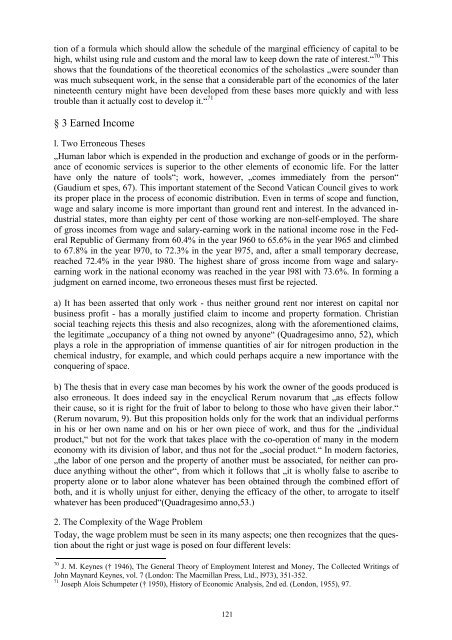Joseph Cardinal Höffner CHRISTIAN SOCIAL ... - Ordo Socialis
Joseph Cardinal Höffner CHRISTIAN SOCIAL ... - Ordo Socialis
Joseph Cardinal Höffner CHRISTIAN SOCIAL ... - Ordo Socialis
Create successful ePaper yourself
Turn your PDF publications into a flip-book with our unique Google optimized e-Paper software.
tion of a formula which should allow the schedule of the marginal efficiency of capital to be<br />
high, whilst using rule and custom and the moral law to keep down the rate of interest.“ 70 This<br />
shows that the foundations of the theoretical economics of the scholastics „were sounder than<br />
was much subsequent work, in the sense that a considerable part of the economics of the later<br />
nineteenth century might have been developed from these bases more quickly and with less<br />
trouble than it actually cost to develop it.“ 71<br />
§ 3 Earned Income<br />
l. Two Erroneous Theses<br />
„Human labor which is expended in the production and exchange of goods or in the performance<br />
of economic services is superior to the other elements of economic life. For the latter<br />
have only the nature of tools“; work, however, „comes immediately from the person“<br />
(Gaudium et spes, 67). This important statement of the Second Vatican Council gives to work<br />
its proper place in the process of economic distribution. Even in terms of scope and function,<br />
wage and salary income is more important than ground rent and interest. In the advanced industrial<br />
states, more than eighty per cent of those working are non-self-employed. The share<br />
of gross incomes from wage and salary-earning work in the national income rose in the Federal<br />
Republic of Germany from 60.4% in the year l960 to 65.6% in the year l965 and climbed<br />
to 67.8% in the year l970, to 72.3% in the year l975, and, after a small temporary decrease,<br />
reached 72.4% in the year l980. The highest share of gross income from wage and salaryearning<br />
work in the national economy was reached in the year l98l with 73.6%. In forming a<br />
judgment on earned income, two erroneous theses must first be rejected.<br />
a) It has been asserted that only work - thus neither ground rent nor interest on capital nor<br />
business profit - has a morally justified claim to income and property formation. Christian<br />
social teaching rejects this thesis and also recognizes, along with the aforementioned claims,<br />
the legitimate „occupancy of a thing not owned by anyone“ (Quadragesimo anno, 52), which<br />
plays a role in the appropriation of immense quantities of air for nitrogen production in the<br />
chemical industry, for example, and which could perhaps acquire a new importance with the<br />
conquering of space.<br />
b) The thesis that in every case man becomes by his work the owner of the goods produced is<br />
also erroneous. It does indeed say in the encyclical Rerum novarum that „as effects follow<br />
their cause, so it is right for the fruit of labor to belong to those who have given their labor.“<br />
(Rerum novarum, 9). But this proposition holds only for the work that an individual performs<br />
in his or her own name and on his or her own piece of work, and thus for the „individual<br />
product,“ but not for the work that takes place with the co-operation of many in the modern<br />
economy with its division of labor, and thus not for the „social product.“ In modern factories,<br />
„the labor of one person and the property of another must be associated, for neither can produce<br />
anything without the other“, from which it follows that „it is wholly false to ascribe to<br />
property alone or to labor alone whatever has been obtained through the combined effort of<br />
both, and it is wholly unjust for either, denying the efficacy of the other, to arrogate to itself<br />
whatever has been produced“(Quadragesimo anno,53.)<br />
2. The Complexity of the Wage Problem<br />
Today, the wage problem must be seen in its many aspects; one then recognizes that the question<br />
about the right or just wage is posed on four different levels:<br />
70 J. M. Keynes († 1946), The General Theory of Employment Interest and Money, The Collected Writings of<br />
John Maynard Keynes, vol. 7 (London: The Macmillan Press, Ltd., l973), 351-352.<br />
71 <strong>Joseph</strong> Alois Schumpeter († 1950), History of Economic Analysis, 2nd ed. (London, 1955), 97.<br />
121















